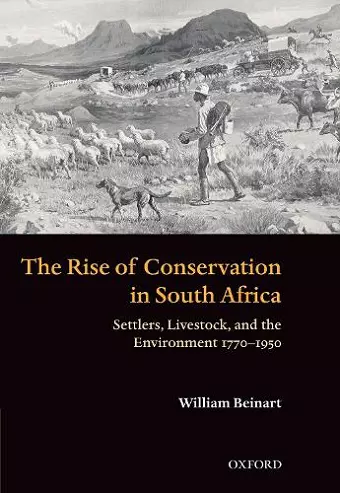The Rise of Conservation in South Africa
Settlers, Livestock, and the Environment 1770-1950
Format:Paperback
Publisher:Oxford University Press
Published:29th May '08
Currently unavailable, and unfortunately no date known when it will be back
This paperback is available in another edition too:
- Hardback£225.00(9780199261512)

The Rise of Conservation in South Africa is an innovative contribution to the growing comparative field of environmental history. Beinart's major theme is the history of conservationist ideas in South Africa. He focuses largely on the livestock farming districts of the semi-arid Karoo and the neighbouring eastern Cape grasslands, conquered and occupied by white settlers before the middle of the nineteenth century. The Cape, like Australia, became a major exporter of wool. Vast numbers of sheep flooded its plains and rapidly transformed its fragile natural pastures. Cattle also remained vital for ox-wagon transport and internal markets. Concerns about environmental degradation reached a crescendo in the early decades of the twentieth century, when a Dust Bowl of kinds was predicted, and formed the basis for far-reaching state intervention aimed at conserving natural resources. Soil erosion, overstocking, and water supplies stood alongside wildlife protection as the central preoccupations of South African conservationists. The book traces debates about environmental degradation in successive eras of South African history. It offers a reinterpretation of South Africa's economic development, and of aspects of the Cape colonial and South African states. It expands the understanding of English-speaking South Africans and their role both as farmers and as protagonists of conservationist ideas. The book is also a contribution to the history of science, exploring the way in which new scientific knowledge shaped environmental understanding and formed a significant element in settler intellectual life. It paints an evocative picture of the post-conquest Karoo, analysing the impact of self-consciously progressive farmers and officials in their attempts to secure private property, curtail transhumance and kraaling, control animal diseases, enhance water supplies, eradicate jackals, destroy alien weeds such as the prickly pear, and combat drought. It concludes by analysing conservationist interventions in the African areas, and discussing evidence for a stabilization of environmental conditions over the longer term.
Review from previous edition 'William Beinart's complex and wonderfully informative book has its origins in the author's long-standing interest in the ideas that 'underpinned environmental regulation in Africa districts' of the Cape Colony and, to a lesser extent , the other territorial components of the Union of South Africa after 1910. * The English Historical Review *
ISBN: 9780199541225
Dimensions: 234mm x 157mm x 24mm
Weight: 703g
456 pages